Judy Garland and James Dean read audiobooks and can already be cloned with AI. But more and more actors are worried that the new technology can be misused.
"What are you going to do with my body and my face when I'm dead? I don't want you to do anything!", said actor Nicolas Cage in an interview with Huffington Post.
AI was a major issue during the Hollywood strike in 2023 and continues to be debated – recently after the news of an app from Eleven Labs, where Judy Garland and James Dean can read out, for example, audiobooks. Dean, who died in a car crash in 1955, is soon also current with his digital image in a new film with the title "Back to Eden".
"Counteracts diversity"
The problem is that it builds on what has already been done and seen – the AI-generated material creates nothing new – but maybe it's "good enough". So it often counteracts innovation and diversity, says Simon Norrthon, chairman of the trade union Scen & Film.
According to him, the new AI development leads to moral and ethical dilemmas for our perception of reality.
Even if we know that a voice is AI-generated, we are still easy to manipulate, and we can still experience that this person actually said something that AI has made them say.
Norrthon also believes that clearer legislation is on the way.
Maybe not necessarily to protect actors, but rather to protect civilians and those in power so that we can know who has said what.
Earlier this year, film star Scarlett Johansson got into a conflict with the company Open AI, after they launched an AI voice that had striking similarities to her voiceover in the film "Her". Johansson described "deep fake" technology in general as "a dark hole you can never climb out of".
"Hottest potato"
Sanna Thiel, a lawyer at the industry organization Film & TV Producers, describes the AI issue as "the hottest potato in the copyright area" and sees both opportunities, challenges, and risks with the technology. An AI tool could, for example, be instructed to write a script or create a film in the same style as a certain author or a certain film.
It is likely that a script or a film that comes out of an AI tool in most cases does not constitute an infringement of an existing work – a style or a manner is not protected by copyright. But the knowledge and information that enable the AI tool's creation have been acquired through training on existing works – such training must be possible for rights holders to oppose.






